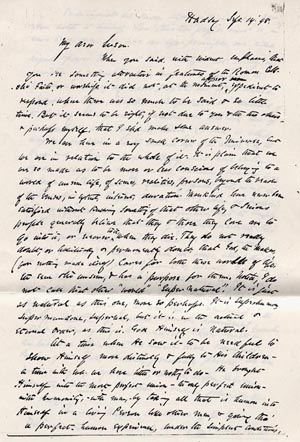
|
Hadley Sept. 14. '98.
My dear Susan -
When you said with evident emphasis, that
you see something attractive in features of the Roman Cath-
olic Faith, or worship, it did not, at the moment, appear [?] expedient to
respond, when there was so much to be said & so little
time. But it seems to be right, if not due to you & to the others -
& perhaps myself, that I sh'd make some answer.
We are here in a very small corner of the Universe, and
we are in relation to the whole of it. It is plain that we
are so made as to be more or less conscious of belonging to a
world of unseen life, of scenes, realities, persons, beyond the reach
of the senses, in extent, interest, duration. Mankind has never been
satisfied without knowing something of that other life, & serious
people generally believe that they & those they love are to
go with it, or nearer to it, when they die. They do not really
doubt, or holistically or permanently doubt, that God, the Maker,
(for nothing made itself) cares for both these worlds of life,
the seen the unseen, & has a purpose for them. Noted, I do
not call that other "world" "supernatural". It is just
as natural as this one, more so perhaps. It is superhuman,
supermundane, superreal, but it is in the actual or
eternal order, as this is. God Himself is Natural.
At a time when He saw it to be needful to
show Himself more distinctly & fully to His children -
a time with wh. we have little or nothing to do - He brought
Himself into the most perfect union - the only perfect union -
with humanity, -into man, - by taking all that is human into
Himself in a living Person like other men, & going thro'
a perfect human experience, under the simplest conditions-
|
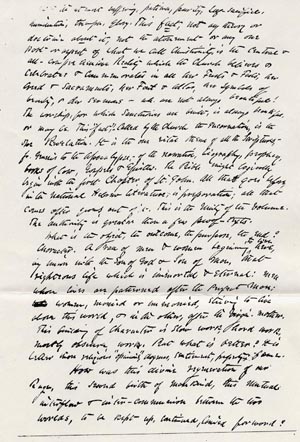
|
[?] the utmost suffering, patience, purity, self-sacrifice,
humiliation, triumph, glory. This fact, not any theory or
doctrine about it, not the atonement or any one
part or aspect of what we call Christianity, is the central &
all-comprehensive Reality which the church believes or
celebrates & commemorates in all her Feasts & Fasts; her
Creed & Sacraments; her Fount[?] & altar, her symbols of
beauty, & her sermons - wh. are not always beautiful!
The worship, for which sanctuaries are built, is always beautiful,
or many be. This "fact," - called by the church the Incarnation, is the
Chr[?] Revelation. It is the one vital theme of all the Scriptures, -
fr. Genesis to the Apocalypse, - of the narrative, biography, prophecy,
books of law, Gospels & Epistles. The Bible might logically
begin with the first Chapter of St. John. All that goes before
in the national Hebrew literature, is 'preparation,' all that
comes after grows out of it. This is the unity of the volume.
The authority is greater than a few proof-texts.
What is the object, the outcome, the purpose, the end?
character. A race of men & women beginning to live here,
by union with the Son of God & Son of Man, that
righteous life which is immortal & eternal: men
whose lives are patterned after the Perfect Man;
[?] women, married or unmarried, striving to live
above this world, or with other, after the 'Virgin' mother.
This building of character is slow work, hard work,
mostly obscure work. But what is better? It is
better than religious "opinons", dogmas, sentiment, prophesy, fame.
How was the divine regeneration of our
[?], this second birth of mankind, this mutual
interflow & inter-communion between the two
worlds, to be kept up, continued, carried forward?
|
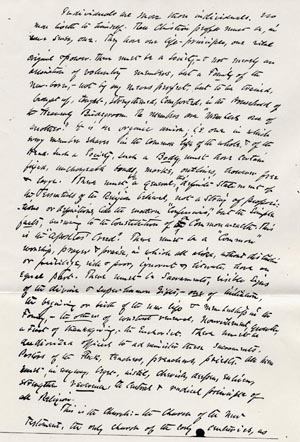
|
Individuals are more than individuals. No
man liveth to himself. The Christian people must be, in
some sense, one. They have our life-principles, our vital
original power. There must be a Society, - & not merely an
association of voluntary members, but a Family of the
new-born, - not by any means perfect, but to be trained,
brought up, taught, strengthened, comforted, in the Household of
the Heavenly Bridegroom. The members are "members one of
another." It is the organic union; i.e. one in which
every member shares in the common life of the whole, & of the
Head. Such a Society, such a Body, must have certain
fixed, unchangeable bonds, marks, outlines, however free
& large. There must be a general, tho' definite statement of
the essentials of the Religion believed, not a string 'of proposi'-
-tions or definitions, like the modern "Confessions," but the simple
facts, answering to the Constitution of the a Commonwealth. This
is the "Apostles' Creed". There must be a "Common"
worship, prayer & praise, in which all alike, without distinction
or privilege, rich & poor, ignorant & literate, have an
equal part. There must be Sacraments, visible Signs
of the divine & superhuman Gifts, - one of initiation,
the beginning or birth of the new life & membership in the
Family, - the other of constant renewal, nourishment, growth,
a Feast of thanksgiving, - the Eucharist. There must be
authorized officers to administer these Sacraments.
Portions of the Flock, teachers, preachers, priests. All these
must, in every way, beget, instil, cherish, deepen, enliven,
strengthen reverence, the central & radical principle of
all Religion.
This is the Church: - the Church of the new
Testament, the only church of the early centuries, as
|
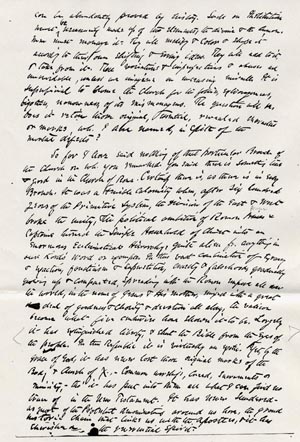
|
can be abundantly proved by history. Since an Institution
must be necessarily made up of two elements, the divine & the human.
Men must manage it. They will modify & color & shape it
according to their own shifting & erring ideas. They will add to it,
& take from it. These variations & imperfections & abuses are
unavoidable, unless we imagine an unceasing miracle. It is
superficial to blame the church for the follies, extravagances,
bigotries, narrowness, of its mismanagers. The question will be,
does it retain those original, essential, revealed characters
or works, wh. I have named, in Spirit of the
mortal defects?
So far I have said nothing of that particular Branch of
the Church on wh. you remarked. You said there is something true
& good in the Church of Rome. Certainly there is, as there is in every
Branch. It was a terrible calamity when, after six hundred
years of the Primitive System, the Division of the East & West
broke the unity, The political ambition of Roman Princes &
Captains turned the Simple Household of Christ into an
Enormous Ecclesiastical Hierarchy, quite alien fr. anything in
our Lord's word or example. In this vast combination of tyranny
& exaction, fanaticism & superstition, cruelty & falsehood, gradually
growing up & compacted, spreading with the Roman Empire all over
the world, in the name of Jesus & His Mother, mixed into a great
deal of goodness & charity & devotion all along, the Vatican
became what five centuries has shown it to be. Largely
it has extinguished liberty, & shut the Bible from the Eyes of
the people. In the Republic it is virtually despotic[?]. Yet, by the
grace of God, it has never lost those original marks of the
Body & Church of X., - Common worship, Creed, Sacraments or
Ministry, - tho' it has put into them all what I can find no
trace of in the New Testament. It has never Sundered -
as just of the Protestant demonstrations around us here, the grand
historical chain that links us with the Apostles, & it has
cherished the Essential Spirit.
|
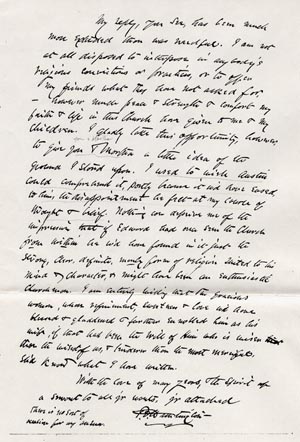
Brown University Libraries
|
My reply, you see, has been much
more extended than was needful. I am not
at all disposed to interpose in anybody's
religious convictions or practices, or to offer
my friends what they have not asked for,
- however much peace & strength & comfort my
faith & life in this Church have given to me & my
children. I gladly take this opportunity, however,
to give you & Martha a little idea of the
ground I stand upon. I used to wish Austin
could comprehend it, partly because it wd have eased,
to him, the disappointment he felt at my source of
thought & belief. Nothing can deprive me of the
impression that if Edward had once seen the Church
from within he w'd have found it if just the
strong, clear, definite, manly form of religion united to his
mind & character, & might have been an enthusiastic
churchman. I am entirely willing that the gracious
woman, whose refinement, sweetness & love w'd have
blessed & gladdened & further enrolled him as his
wife, if that had been the will of Him who is wiser [?]
than the wisest of us, & tenderer than the most merciful,
sh'd know what I have written.
With the love of many years, the Spirit of
a servant to all y'r wants, y'r attached
F D Huntington -
There is the sort of
occasion for my answer.
|

